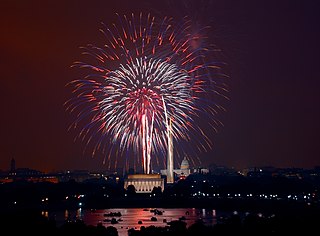July 4th: One Piece of Our Founding Trilogy
July 1, 2021

We should not view the three holidays of April 9th, Juneteenth, and July 4th as wholly distinct occasions, but rather as three parts of a coherent American whole.

We should not view the three holidays of April 9th, Juneteenth, and July 4th as wholly distinct occasions, but rather as three parts of a coherent American whole.
The all too human urge to simplify rather than supplement propels the bitterness and divisiveness of our political and historical debates. In confronting our past and present, we reject complexity and opt for simple stories. This drives resentment, mutual suspicion, and contempt. It further divides our already divided nation.
We should supplement, complicate, and enrich—not simplify—our understandings of ourselves and our shared political community. We can do that through nuanced stories, through history—and the 4th of July offers a welcome opportunity to begin.
Although the Declaration of Independence itself and its author were beset by contradictions, it espouses radical and powerful principles—informed by European and Scottish enlightenment ideas—that constitute the very best of who we are and aspire to be as Americans. Honoring and reflecting on it each year is essential. But the old, uncritical celebration of the 4th will no longer do. We are too painfully aware of the contradictions of the Declaration and the Revolution it legitimized. Rather than casting off our Revolutionary inheritance, though, we should supplement it.
We should celebrate the Fourth alongside Juneteenth, treating them not as separate holidays but as irrevocably connected. And we should officially honor April 9th, the anniversary of U.S. General Ulysses S. Grant accepting Confederate General Robert E. Lee’s surrender at Appomattox Courthouse in 1865, to commemorate the point at which the loose, long contested Union morphed into one nation, indivisible, promising liberty and justice for all.
Taken together, April 9th, Juneteenth, and the 4th would constitute a founding trilogy. In celebrating this trilogy each year, we would honestly grapple with our nation’s conflicted, sometimes cruel and anguished past, give voice to the noblest of our national principles, and cherish the bonds that hold us together despite our enduring disagreements. Rather than simplifying who we are, this American trilogy will supplement and enrich our national self-understanding.
In celebrating Juneteenth each year, we will center our attention on the grave evil of slavery and celebrate its abolition. Juneteenth will remind us of how racism shaped our society and how it persists on structural and interpersonal levels to this very day. In addition to fostering such sober reflection, though, Juneteenth will also remind us that evils and inequalities grounded in tribalism and race hatred—like slavery—are not set in stone. They can be ameliorated, even overcome, sometimes through force of arms, but also through the persuasive power of certain universalist ideals.
The Declaration of Independence articulates those ideals with unparalleled clarity. We must celebrate the Declaration each July 4th to lift up its enduring values. The self-evident truths of the Declaration are still true and deserving of our veneration. Moreover, they helped propel and legitimize the many successful struggles for justice that make today’s America a freer and more equal place for all than ever before. We must not discount the ideological power and the truth of our Declaration. The greatest Americans surely haven’t.
President Lincoln’s commitment to the Declaration’s promise motivated his fight against secession and slavery—for he “never had a feeling politically that did not spring from the sentiments embodied in the Declaration of Independence.” Similarly, leaders of the women’s suffrage movement grounded their advocacy in Jefferson’s preamble. And Martin Luther King, Jr. sought to cash in on the “promissory note” of equal liberty first signed by the founders. Setting aside the Declaration would require forgetting its moral power and the central role it’s played in past American struggles.
But in celebrating the Declaration and its ideals, we need not mistake it—or the Revolution—for the central act of our national founding. It would take the Civil War to found a veritable American nation. Until the Union was restored and Reconstructed on a new foundation of nationally protected human rights, Americans only enjoyed fleeting moments of national unity—like during the Revolution and the War of 1812 (and even then, those efforts were often hampered by internal divisions and weak national loyalties). Americans identified with their states and regions above the nation. They were Virginians and New Englanders first, Americans second.
The Union Army’s defeat of the Confederacy changed that. With the Confederate surrender at Appomattox, Lincoln’s vision of an indivisible nation became a reality. In celebrating April 9th, we can remind ourselves that our national cohesion is not a given. It was hard-fought. It is relatively new. It must be cherished. We are called to preserve and strengthen our principled unity in the face of those who sow the seeds of division. We should formally recognize the 9th as a federal holiday, and celebrate it each year alongside Juneteenth and the 4th.
We should not view these three holidays of April 9th, Juneteenth, and July 4th as wholly distinct occasions, but rather three parts of a coherent American whole. Together, they amplify themes of imperfection, principle, progress, and unity. They stress the messiness of our past and remind us of the boundless opportunities of our present. This founding trilogy—or trinity, even—will give narrative nourishment and substance to our beleaguered American creed of equal liberty, individual rights, and self-government. And it will remind us that very little about America in both its past and present iterations has been simple. There is reason to believe the trend will persist.
Thomas Koenig is an incoming 1L student at Harvard Law School. Twitter @thomaskoenig98.
Suggested Reading:
Liberty Matters, July 2021, "Understanding Jefferson: Slavery, Race, and the Declaration of Independence"